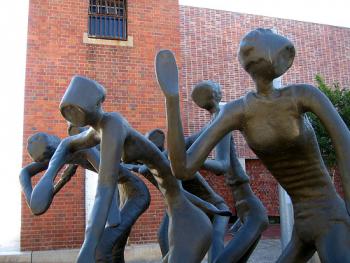Posted on September 22, 2009

In the last Archival Platform blog, we explored the role and mandate of the state in promoting and protecting arts and culture in South Africa. This time we speak to the role of the citizen, academic, and practitioner.
Mike van Graan has reminded us that as citizens, artists and other workers in the culture sector need to take action. He says 'If the arts sector spent at least as much time reflecting on our own culpability for the state of our sector as looking for scapegoats elsewhere, we will have to concede that often, we get - or have - what we deserve'. Sifiso Ndhlovu underlined this point on our website last month.
If we hold the conviction that arts and culture matters in society, not just for recreation but for education, health, equality, citizenship and democracy, how do we stand up for arts and culture?
Participate in critical, constructive debate about heritage, citizenship and human rights issues
We live in interesting times politically. South Africans are revisiting some of the questions that were taken for granted in the 1994 transition. Many of these questions touch on the relationship between cultural practice and human rights. On the one hand, many community members opposed the recent ban on virginity testing. This month, lobby groups like the National Interfaith Leadership Council want to re-open the discussion on legalising abortion and same-sex marriages.
On the other hand, public debates about issues such as polygamy and traditional circumcision are also growing in scale and complexity. This heritage month we not only see the launch of a new novel about traditional male circumcision but also a book about experiences of polygamy. These debates on cultural practice or religion are often very polarised. One side often ends up feeling rejected, disrespected or silenced. As heritage practitioners, or archivists, and as citizens, these debates affect us. We need to participate in them, developing ethical and sensitive ways of negotiating this difficult territory in productive new ways.
Share information and put yourselves out there
In a small community like the South African arts and culture sector, we paradoxically often find ourselves divided by disciplinary silos, digital divides, institutional hierarchies and other barriers to the free exchange of information. After putting together a monthly sector newsletter for over three years now, I still discover new organizations, initiatives and resources every day.
Support local organizations and foster young talent

The challenges facing young people in the sector are great. Consultants cannot afford to take on student trainees. Museums and archives do not have enough guided internships to help young students gain experience, and the learnership system is still weak. Education in the sector usually trains young people as practitioners or as academics, seldom straddling both. We can put more effort into registering learnerships, offering internships, mentoring your professionals, and lobbying professional organizations to offer student rates.
Think global, act local
We are still calling for more submissions to our campaign to help the new minister feel the pulse of the sector: write your Letter for Lulu today!
What we need, more than ever, are local networks of practitioners and institutions sharing ideas, skills and resources. The NMF has hosts regular workshops on critical issues such as the Protection of Personal Information Bill. And I'm sure other organisations are doing similar things around the country. Adrienne van Eeden of DOXA recently organized several workshops in which lawyers such as Andrew Rens discussed how digitizing archival and heritage collections was affected by copyright and privacy law. We've started an online discussion on issues of copyright and privacy for digitised collections.
How can these interactions become more regular? I have to commend the initiative of SAHO (SA History Online) in putting networks of teachers together to strengthen history teaching. We at the Archival Platform would like to encourage the development of a series of informal networks of archive managers, heritage and archive practitioners across South Africa. If you want to facilitate such a network to address our sector concerns, {encode="director@archivalplatform.org" title="get in touch"} with us.
Photo attribution, statue:
Photo attribution, silver mime: